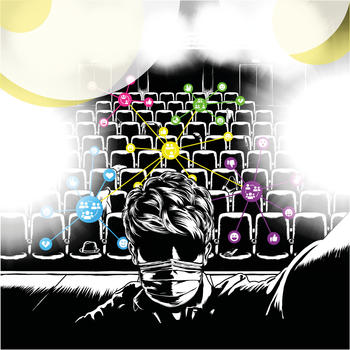Event Series | Temporal Communities and Digitality – Theatre During the Pandemic, No. 6 South Africa
A series of events organised by Doris Kolesch and Kai Padberg, Research Area 2: "Travelling Matters".
This event will be streamed live.
To participate in the discussion, please register with Judith König (j.koenig2@fu-berlin.de) by 2 May 2021.
The sixth event of our series is an online talk with Namatshego Khutsoane and Aubrey Sekhabi.
Moderation: Doris Kolesch
Namatshego Khutsoane is a creative practitioner drawn to work that explores complex human and social issues. As an experienced theatremaker and educator Tshego has honed her expertise enabling learning and engagement in her work across multiple performance and facilitation contexts for more than a decade. Through various creative international collaborations and exchanges as a performer, theatremaker and facilitator, Tshego has travelled abroad to Ethiopia, Germany, Netherlands, Senegal, Switzerland, and Zambia. Tshego enjoys involvement in site-responsive performance, collaborative theatre making and devising, intercultural and interdisciplinary performance, and gender studies. She is a member of the interdisciplinary art space »The Centre for the Less Good Idea« in Johannesburg and »The Public Arts Festival« in Cape Town.
Aubrey Sekhabi has held the position of artistic director of the State Theatre in Pretoria for a decade, after eight successful years with the Northwest Arts Council. Involved in a great number of productions for stage and television as a playwright, actor and director, he has won several rewards including the FNB Vita Awards and the Standard Bank Young Artist Award for Drama. Sekhabi is also the founder member and president of GBR productions and serves on the National Arts Festival Artistic Committee, and is thus well placed to give his input on the state of South African theatre.
It was the middle of March 2020 when Germany went into lockdown. Back then, there had already been a curfew in Wuhan, China, for several weeks. In many other countries in Europe and worldwide, public life was abruptly shut down. The consequences for the cultural sector have been dire everywhere. All over the world, theatres have had to shut down unexpectedly and most remain closed. Schedules have been cancelled. Professional existences are endangered. At the same time, public and cultural life has shifted to the digital sphere. Many theatres and artists are using this way to stay in touch with their audiences and are exploring digital spaces more than ever before. But what forms of community-building are even remotely possible for theatre and the performing arts? What is the character of the relation between local institutions and these transnational spaces, which might open up and expand while national borders remain closed? What does it mean for artistic practice if humans assemble as a virtual audience while being physically alone in their respective homes? In what ways will the pandemic change theatre? What will digital assemblies mean for theatres after the pandemic?
In the series of events entitled "Temporal Communities and Digitality – Theatre During the Pandemic", theatre directors, theatre artists and scholars from around the world will report on the practical effects on theatre operations and their work. They will examine the various strategies with which stage and theatre creators have reacted to this situation, online and offline. Together with researchers from the Cluster of Excellence "Temporal Communities: Doing Literature in a Global Perspective", they will discuss how the global crisis of the theatre has created new temporal communities and to what extent these are created under the conditions of digitality.
This event is part of our series "Temporal Communities and Digitality - Theatre During the Pandemic".
